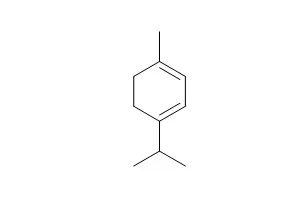| Description: |
alpha-Terpinene has antioxidant activity, it induces oxidative stress, cytotoxic and genotoxic effects in liver tissue involving the caspases activation. |
| Targets: |
ROS | GPx | CAT |
| In vitro: |
| Chemical Research in Toxicology, 2012, 25(3):713-721. | | α-Terpinene, an antioxidant in tea tree oil, autoxidizes rapidly to skin allergens on air exposure.[Reference: WebLink] | The monoterpene alpha-Terpinene is used as a fragrance compound and is present in different essential oils. It is one of the components responsible for the antioxidant activity of tea tree oil. alpha-Terpinene is structurally similar to other monoterpenes, e.g., limonene, known to autoxidize on air exposure and form allergenic compounds. The aim of the present study was to investigate the possible autoxidation of alpha-Terpinene at room temperature.
METHODS AND RESULTS:
To investigate the sensitization potency of air-exposed alpha-Terpinene and the oxidation products formed, the murine local lymph node assay was used. Chemical analysis showed that alpha-Terpinene degrades rapidly, forming allylic epoxides and p-cymene as the major oxidation products and also hydrogen peroxide. Thus, the oxidation pathway differs compared to that of, e.g., limonene, which forms highly allergenic hydroperoxides as the primary oxidation products on autoxidation. The sensitization potency of alpha-Terpinene was increased after air-exposure. The allylic epoxides and a fraction, in which only an α,β-unsaturated aldehyde could be identified, were shown to be strong sensitizers in the local lymph node assay. Thus, we consider them to be the major contributors to the increased sensitization potency of the autoxidized mixture. We also investigated the presence of alpha-Terpinene and its oxidation products in four different tea tree oil samples of various ages.alpha-Terpinene and its oxidation products were identified in all of the tea tree oil samples.
CONCLUSIONS:
Thus, from a technical perspective, alpha-Terpinene is a true antioxidant since it autoxidizes rapidly compared with many other compounds, preventing these from degradation. However, as it easily autoxidizes to form allergens, its suitability can be questioned when used in products for topical applications, e.g., in tea tree oil but also in cosmetics and skin care products. |
|
| In vivo: |
| Journal of Applied Biomedicine, 2017:S1214021X16303507. | | Monoterpene alpha-terpinene induced hepatic oxidative, cytotoxic and genotoxic damage is associated to caspase activation in rats.[Reference: WebLink] |
The aim of this study was to investigate the occurrence of toxic effects in liver tissue of rats treated with α-terpinene.
METHODS AND RESULTS:
All treatments were intraperitoneally administered at doses of 0.5, 0.75 and 1.0 ml kg−1 during 10 days. Liver samples were collected and assessed by histopathological analysis, caspases -1, -3, -8 assay, biomarkers of hepatic damage and determination of oxidant/antioxidant status (thiobarbituric acid-reactive substances (TBARS), catalase (CAT), superoxide dismutase (SOD), reactive oxygen species (ROS), glutathione S-transferase (GST) and glutathione peroxidase (GPx)). Additionally, the cytotoxic and genotoxic effects were evaluated by comet assay. An increase was observed on TBARS levels and GPx activity on the hepatic tissue. Instead, CAT and SOD activities decreased in rats treated with a dose of 1.0 ml kg−1 of alpha-Terpinene. Concomitantly, ROS levels increased and GST levels decreased in rats treated with alpha-Terpinene at doses of 0.5, 0.75 and 1.0 ml kg−1. Also, there was an increase in frequency of damage, damage index and caspases, while cell viability decreased in rats treated with alpha-Terpinene. Alanine aminotransferase and aspartate aminotransferase increased in rats treated with 1.0 ml kg−1 of alpha-Terpinene.
CONCLUSIONS:
Therefore, alpha-Terpinene induces oxidative stress, cytotoxic and genotoxic effects in liver tissue involving the caspases activation. |
|






 Cell. 2018 Jan 11;172(1-2):249-261.e12. doi: 10.1016/j.cell.2017.12.019.IF=36.216(2019)
Cell. 2018 Jan 11;172(1-2):249-261.e12. doi: 10.1016/j.cell.2017.12.019.IF=36.216(2019) Cell Metab. 2020 Mar 3;31(3):534-548.e5. doi: 10.1016/j.cmet.2020.01.002.IF=22.415(2019)
Cell Metab. 2020 Mar 3;31(3):534-548.e5. doi: 10.1016/j.cmet.2020.01.002.IF=22.415(2019) Mol Cell. 2017 Nov 16;68(4):673-685.e6. doi: 10.1016/j.molcel.2017.10.022.IF=14.548(2019)
Mol Cell. 2017 Nov 16;68(4):673-685.e6. doi: 10.1016/j.molcel.2017.10.022.IF=14.548(2019)